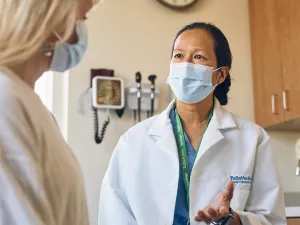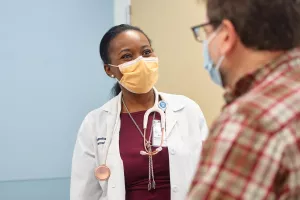Our team of friendly and highly skilled emergency medicine specialists is always ready to help you start feeling better. Don't wait any longer to get the care you need — visit us today or whenever you need urgent care.
Urgent care for your immediate needs
If you or a loved one is feeling great or have an injury that needs to be looked at right away but isn't an emergency, our urgent care centers are an excellent option. Our medical professionals are available to assist you with everything from the flu to a fracture and, if necessary, we can refer you to a local emergency department if you require that level of care. We care about your well-being and are here to provide you with the best possible care.
In the case of a serious emergency like a bad accident, stroke, difficulty breathing or chest pains, it's important to call 911 or go to the closest emergency department immediately.

Conditions
Don't delay getting the treatment you need. If you can't see your primary care doctor or require care, our urgent care experts are here for you. We provide fast, high-quality care and can test, diagnose and treat a range of illnesses and injuries right here on-site. Trust us to provide the care you need, and we can even connect you with follow-up care if necessary.
Remember, call 911 or go to the nearest emergency department if you experience any of these symptoms or injuries that may be life-threatening:
- Severe, uncontrollable bleeding
- Open fractures (meaning you can see the bone outside of your skin)
- Head injuries
- Chest pain
- Trouble breathing
- Weakness or numbness on one side of the body
Testing
When you come to one of our urgent care centers, we'll make sure to take care of all the tests you need. Our team will be happy to share the results with you and your primary care doctor to ensure you get the best possible care.
Tests we may perform include:
- COVID-19
- Glucose
- Hemoccult
- Influenza (flu)
- Mononucleosis
- Pregnancy
- Strep throat
- Urinalysis
- X-ray
Treatments
We can take care of everything from giving you medicine to fixing broken bones and sewing up cuts. We can also test you quickly for sicknesses and send you to see a specialist if needed.
FAQs
If you need immediate care and it is not an emergency, you can always contact your primary care doctor first. They know you, your medical history and your current medications and can treat minor problems such as sore throat, earaches, rashes and cuts. They usually have a few urgent appointments available each day. They can also advise you on how urgent your medical needs are.
You can visit urgent care if you have an immediate sickness, illness or injury and your primary care doctor is not available.
You should not visit an urgent care if you are experiencing a medical emergency such as chest pain, severe bleeding, difficulty speaking or breathing, are considering harming yourself or others, or other major trauma.
You should go to your closest emergency department or call 911 if you have a life-threatening emergency, such as chest pain, severe bleeding, difficulty speaking or breathing, are considering harming yourself or others, or other major trauma. Or feel like you need to be seen by a doctor when your primary care doctor is unavailable and urgent care is closed.

From regular office visits to inpatient stays, find the healthcare you need and deserve close to home.